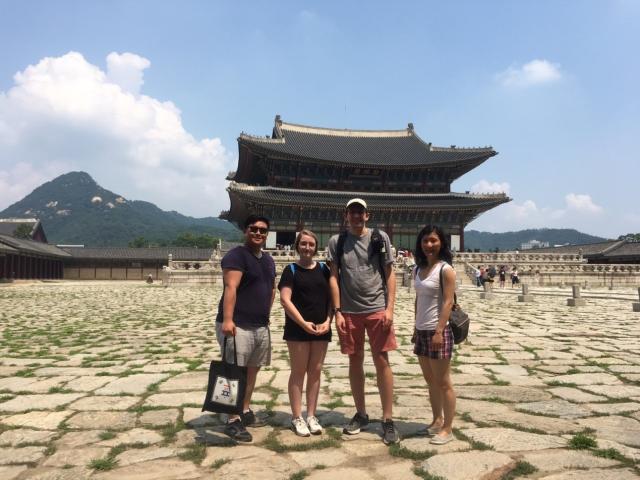A United Church young adult who participated in a Pilgrimage of Justice and Peace to Korea shares her experience.

“Without history, there is no future.” I had the privilege to take part in the Pilgrimage of Justice and Peace in the Korean Peninsula in August with over 70 young adults between the ages of 20 and 35 from approximately 20 different countries. This anonymous quote, shown in a video at the beginning of our pilgrimage, echoed in my mind throughout the remainder of my trip.
Having focused most of my high school and university studies in the sciences, I have to admit that I am a little ignorant when it comes to world history. Aside from reading the information gleaned from high school social studies textbooks, I have not actively sought stories of the past. Perhaps at a subconscious level, I chose to stay ignorant to shield myself from the despondency that would result from learning about the tragedies of war.
Nevertheless, as I mature, I realize that I cannot stay living inside a cocoon. So, I went to Korea with an open mind and an open heart, ready to receive, ready to completely absorb myself in all that the country has to offer, to learn about its past and ways to perhaps move forward in the future.
In Gwangju, not only did I visit the cemetery where victims of the May 18 Gwangju Uprising were buried, I also stood in the building used as citizen resistance headquarters during the democratization movement, which became the last battlefield on May 27, 1980. I learned about the personal stories of many youth who courageously fought against the military regime, as well as stories of others rallying together to provide food and supplies in support of their efforts.
At Guryong Village, I stood atop grassy knolls, perplexed by the cold-blooded killings carried out by the police and the military, while a few feet below the ground were mass graves where thousands who were suspected of having communist sympathies were buried after being brutally murdered.
At the No Gun Ri Memorial Peace Park, we stayed overnight in an education centre surrounded by perfectly manicured gardens teeming with a great variety of flowers, as lush mountains soared in the distance. Against this beautiful and serene backdrop, I learned about the hundreds of refugees, mainly women, children, and the elderly, who were mercilessly shot at by U.S. soldiers in July 1950, under the Twin Tunnels Bridge. This incident remained unpublished until almost 50 years later.
At the Korean Demilitarized Zone, we visited the last train station in South Korea before entering North Korean territories. When in operation, this station will not only connect the Korean Peninsula, but also link to railroads across Russia and the rest of Europe. It’s a symbol of hope for ongoing peace talks to take place between the North and the South.
Back in Seoul, we attended a lecture on sexual slavery during the Japanese military occupation and visited Seodaemun Prison History Hall, where we learned of the various torture methods inflicted upon independence and pro-democracy activists, many of whom were martyred while in prison.
The more that I learn, the more questions I have. At what point does a human being turn into a cold-blooded instrument of mass killing? If the democracy of my country was at stake, would I also take up arms and fight? Could there be peace without justice? And what is the cost of achieving both peace and justice in the world?
The pilgrimage culminated in a joint prayer service for peace in Northeast Asia and for the peaceful reunification of the Korean Peninsula. It was an inspiring service that acknowledged the past, but also gave us hope for the future.
It has been such a gratifying experience to take part in this journey with a group of passionate young leaders wanting to make a difference. Although we come from diverse backgrounds and customs, we all long for the same things: peace, justice, and freedom, not just in the countries that we live in, but throughout the world.
“Without history, there is no future.” This week of pilgrimage opened my eyes and forced me to come out of my cocoon of ignorance. It is my hope that we all educate ourselves, so that we never forget the atrocities of war. Let us remember that deep down, we all long for peace. And let us ensure that the injustices experienced by the Korean people, as well as by so many others around the globe, will never be repeated.
–Sandy Hwang attends Pacific Spirit United Church in Vancouver.
Sandy Hwang (Vancouver), Joseph Yong Wook Kim (Toronto), Amy Wood (Winnipeg), and Scott Kell (London, Ontario) are eager to share their experiences of this unique young adult pilgrimage and work together towards peace and reunification. To invite one of them as a speaker, please contact pip@united-church.ca.
Does this blog pique your interest to participate in people-to-people opportunities with global partners? We invite you to find out more at the People in Partnership webpage or by emailing us.